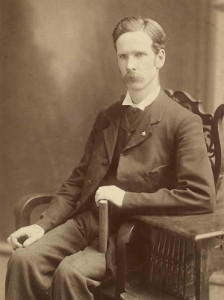
(Click here for various works by him.)
O’Dowd had some of his early poetry published in the Ballarat Courier newspaper. He also contributed poetry to The Bulletin magazine. His poetical works were published in several books during his lifetime.
Bernard O’Dowd’s poetry received some critical acclamation. However, his style of poetry was not one designed for the common people.
Walter Murdoch, a good friend of O’Dowd, wrote that his poetry was well-regarded, but not styled for the masses: “he had earned a high and sure place in the regard of all who care for Australian poetry . . . He will never, I think, be a popular poet. He was not a mighty-mouthed inventor of harmonies; any more than he was a singer of sweet songs.”[1]
Ken Stewart, Honorary Research Associate at the University of Sydney, has written critically of O’Dowd’s style, saying: “O’Dowd allows his ‘erudition’ to become digressive, and it undermines the bardic authority of any philosophic or ‘transcendental’ role by leading the reader on trails of verbal ostentation, in ‘learned’ puzzles and conceits. . . . The problem is not only that, as Chris Wallace-Crabbe has observed, ‘at every stage his poems were limited in their general appeal by an Olympian diction that could seem knobbly, contorted, arcane and devastatingly abstract’, but also that such diction actually asphyxiates the bardic and prophetic voice of erudition.”[2]
Peter Kirkpatrick’s thoughts on O’Dowd were in a similar vein: “his poetic manner: humourless, overblown, and relentlessly allegorical . . . His reputation rests on the long discursive poem The Bush (1912), where the pentameter line permitted some relaxation of his allegorical shorthand.”[3]
O’Dowd was headmaster of St. Alipius’ school in Ballarat, but lost his job because of his secular views; he joined the public service, worked in the Crown Solicitor’s Office in Melbourne, was appointed assistant librarian in the Supreme Court, and later became State parliamentary draughtsman
Politically, O’Dowd was a socialist. He was active with the Victorian Socialist League and was a founding member of the Victorian Socialist Party. In 1912 he declared his opposition to the White Australia Policy, a stand which was somewhat controversial, as the VSP was divided between those socialists who were for a White Australia, such as John Curtin (later Prime Minister of Australia) and Marie Pitt (a poetess, who was O’Dowd’s defacto wife), and those who were against it. He also wrote for the Tocsin, a radical newspaper which he founded with two friends.
Moving away from his secular views, he declared in his preface to Dawnward? (1903) that he had “returned to Christianity”. He dabbled in various religious and spiritual movements, joining the Theosophical Society, the Australian Church (led by Dr. Charles Strong), the Free Religious Fellowship, and later formed an attachment with the Unitarian Church.
Bernard O’Dowd died on 1 September 1953.
Books and other works by Bernard O’Dowd:
Works of Bernard O’Dowd
References:
Chris Wallace-Crabbe, “O’Dowd, Bernard Patrick (1866–1953)”, Australian Dictionary of Biography, National Centre of Biography, Australian National University (accessed 10 January 2014)
[1] Walter Murdoch, “Bernard O’Dowd was a poet who meant all he said”, The West Australian, (Perth, WA), 12 September 1953, p. 17
[2] Ken Stewart, “Transcendentalism, Emerson and Nineteenth-Century Australian Literary Culture”, in: Robert Dixon and Nicholas Birns (editors), Reading Across the Pacific: Australia-United States Intellectual Histories, Sydney University Press, 2010, pages xi, 51-52
[3] Peter Kirkpatrick, “‘New words come tripping slowly’: Poetry, popular culture and modernity, 1890-1950”, in: Peter Pierce (editor), The Cambridge History of Australian Literature, Port Melbourne, 2009, page 208
Further reading:
Bernard Dowd, Wikipedia (accessed 10 January 2014)
P. D. Gardner and Joe Toscano, “Bernard O’Dowd 1866-1953”, Radical Tradition, Takver’s Initiatives (accessed 10 January 2014)
Leave a Reply